Overview
This article outlines ten niche marketplace ideas designed to cultivate targeted business success by addressing specific consumer needs across diverse sectors.
Each concept is bolstered by relevant market trends and statistics, underscoring the significance of user-centric design and customized solutions.
These elements are crucial for enhancing engagement, driving sales, and adapting to the ever-evolving preferences of consumers.
Introduction
As the digital marketplace evolves, the potential for niche marketplaces to thrive has reached unprecedented heights. Entrepreneurs are increasingly recognizing the significant advantages of targeting specific audiences with tailored solutions, ranging from custom software development to unique product offerings. This article delves into ten innovative niche marketplace ideas that not only address distinct consumer needs but also present substantial opportunities for business growth.
What challenges may arise in navigating these specialized markets, and how can businesses effectively position themselves for success in an increasingly competitive landscape?
SDA: Custom Software Development for Niche Marketplaces
SDA stands out as a leader in custom software development, establishing itself as the ideal partner for enterprises seeking to create niche marketplace ideas. By leveraging advanced technologies and emphasizing user-centric design, SDA develops platforms that are specifically tailored to distinct audiences, thereby significantly enhancing user engagement and driving sales. This strategic emphasis not only enables businesses to effectively connect with their but also cultivates a seamless user experience.
Committed to quality assurance and deploying dedicated development teams, SDA ensures that each marketplace solution is robust, scalable, and adaptable to the ever-evolving demands of the market. As the e-commerce landscape shifts towards personalized shopping experiences, the importance of user-focused design becomes increasingly clear.
Studies indicate that systems designed with the user in mind achieve higher engagement rates and conversion metrics. For example, the personalized products market is projected to reach $46.2 billion by 2027, highlighting the immense potential for tailored solutions. Successful niche marketplace ideas, like Reverb and Rover, exemplify how tailored solutions can capture dedicated customer bases and drive sustainable growth.
However, it is essential to recognize the challenges faced by specialized platforms, including the necessity for strategic investment and partnerships, which are vital for scaling and mainstream adoption. As industry specialists note, niche marketplace ideas provide the chance to direct your service offerings to the appropriate audience—without needing to compete with other unrelated goods and services, underscoring the strategic advantage of focusing on specific market segments.
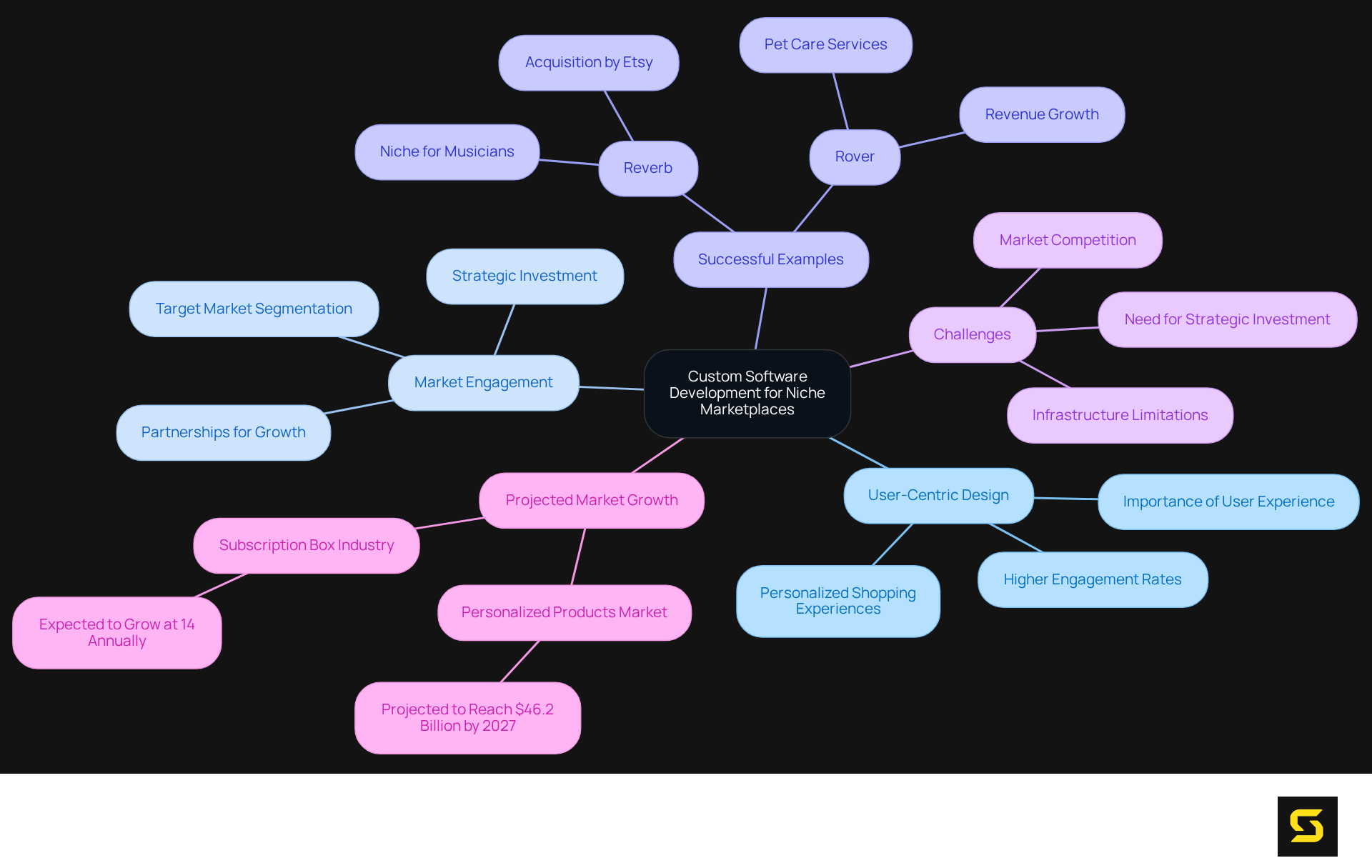
Print-on-Demand: Create Unique Products for Targeted Audiences
The print-on-demand model empowers entrepreneurs to craft distinctive items that resonate with specific audiences, which can serve as niche marketplace ideas like custom apparel, home decor, and personalized gifts. By leveraging SDA's custom software solutions, companies can establish intuitive platforms that enhance the design and ordering processes. This strategy not only reduces initial investment costs but also facilitates the swift testing of new concepts—an essential practice given that only 24% of print-on-demand startups survive in the long term.
By remaining agile and responsive to customer feedback and market dynamics, businesses can adeptly modify their offerings to align with evolving consumer preferences, especially as 36% of consumers now expect personalized items as a standard.
With the projected to soar to $75.30 billion by 2033 and expanding at a CAGR of 26%, the capacity to adapt swiftly is crucial for enduring success.
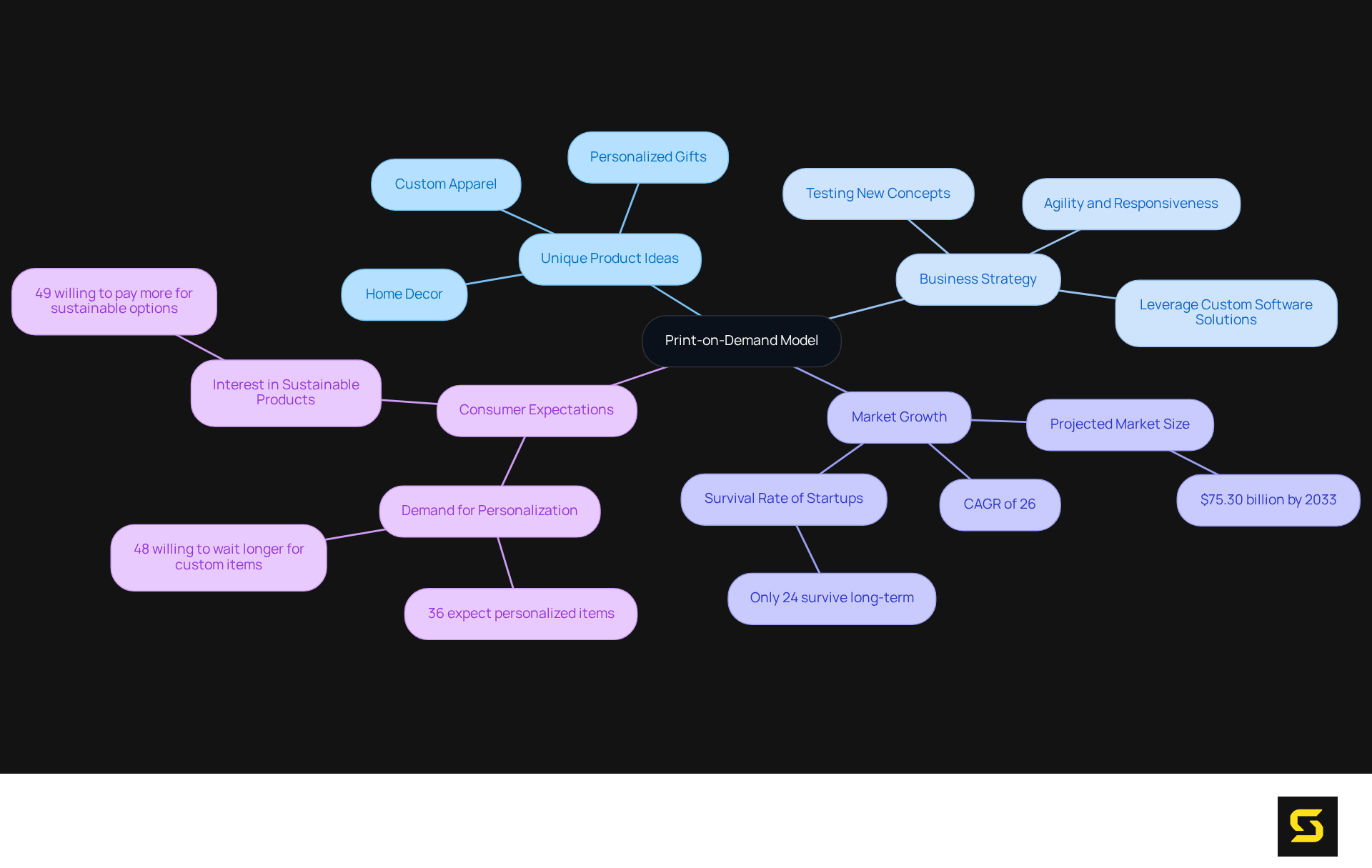
Health and Wellness Marketplace: Focus on Fitness and Nutrition Products
A health and wellness platform represents a diverse array of offerings, from fitness gear to nutritional supplements. Leveraging SDA's expertise in custom software development, businesses can create a platform that not only showcases these products but also delivers personalized recommendations tailored to user preferences and goals. Notably, statistics reveal that 70% of consumers prioritize eco-friendly and ethically made wellness items, highlighting a significant market demand for transparency and sustainability.
By incorporating features such as fitness tracking and community support, user engagement can be greatly enhanced; indeed, 63% of consumers believe that health-oriented technology products effectively improve health and wellness. As Indra Nooyi aptly states, "By putting the employee first, the customer effectively comes first by default," emphasizing the critical importance of prioritizing user experience in the development of health-focused platforms.
In addition, Marta Cyhan-Bowles reinforces this notion by asserting that "Consumers are ready to invest in their well-being but need guidance," thereby underscoring the necessity for accessible and clearly labeled items. This strategic approach not only enhances but also fosters loyalty, positioning the platform as a leader in the competitive health and wellness sector.
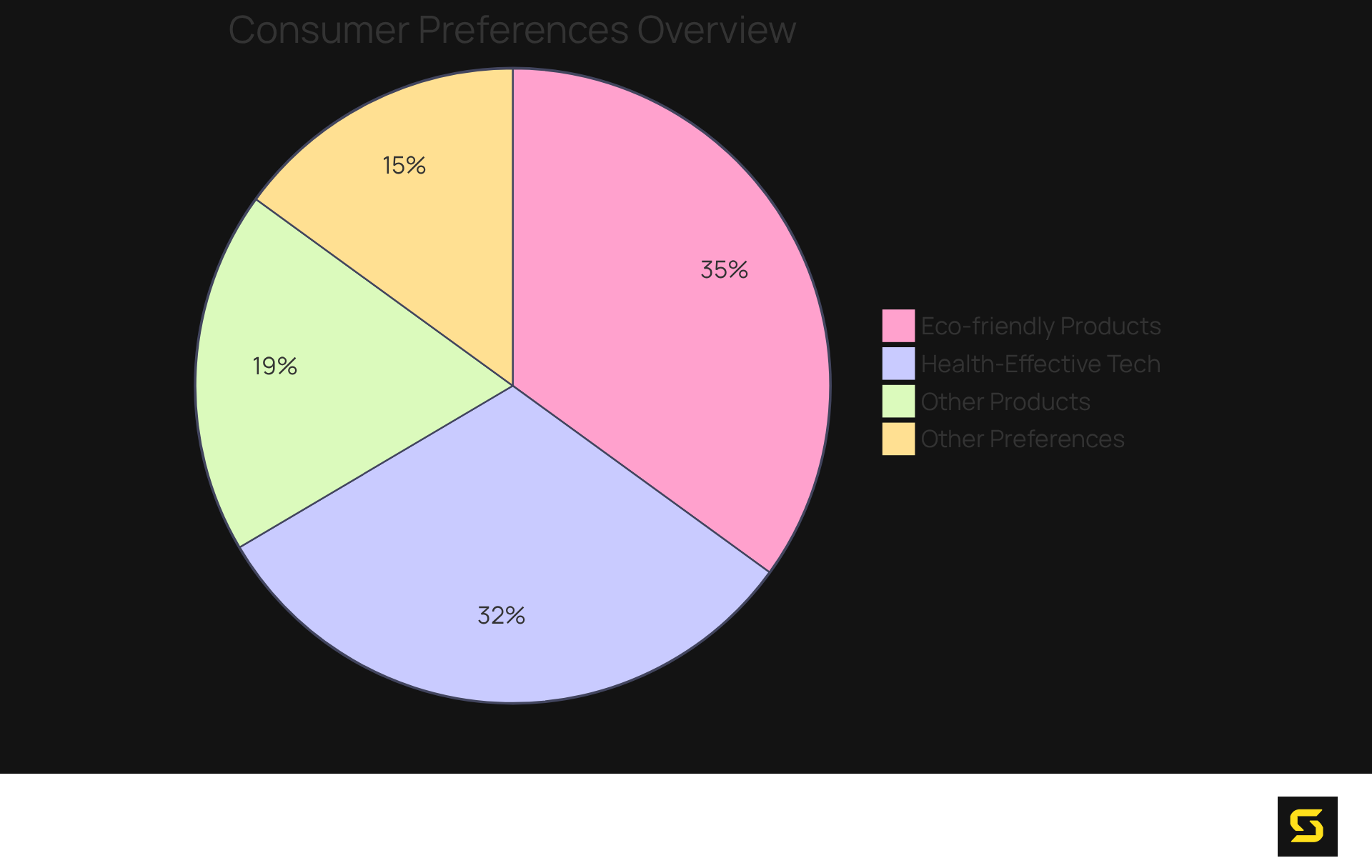
Sustainable Products Marketplace: Cater to Eco-Conscious Consumers
Establishing a platform for sustainable items empowers companies to effectively engage with eco-conscious customers in search of environmentally friendly alternatives. This marketplace can feature a diverse array of products, including:
- reusable household goods
- organic clothing
- zero-waste personal care items
With the market for sustainable goods projected to reach USD 15.06 billion in 2024 and grow to USD 47.03 billion by 2032—fueled by a remarkable 71% increase in online searches for these offerings over the past five years—leveraging SDA's custom software solutions becomes imperative. These solutions can create a platform that not only highlights the sustainability of offerings but also educates consumers on eco-friendly practices and nurtures a vibrant community of like-minded individuals.
As Randi Kronthal-Sacco, a Senior Scholar at the NYU Stern Center for Sustainable Business, observes, "sustainable products continue to thrive, presenting opportunities for brands to capture market share amid rising consumer demand." By prioritizing sustainability in their digital strategies, companies can align with consumer values and drive growth in an evolving marketplace.
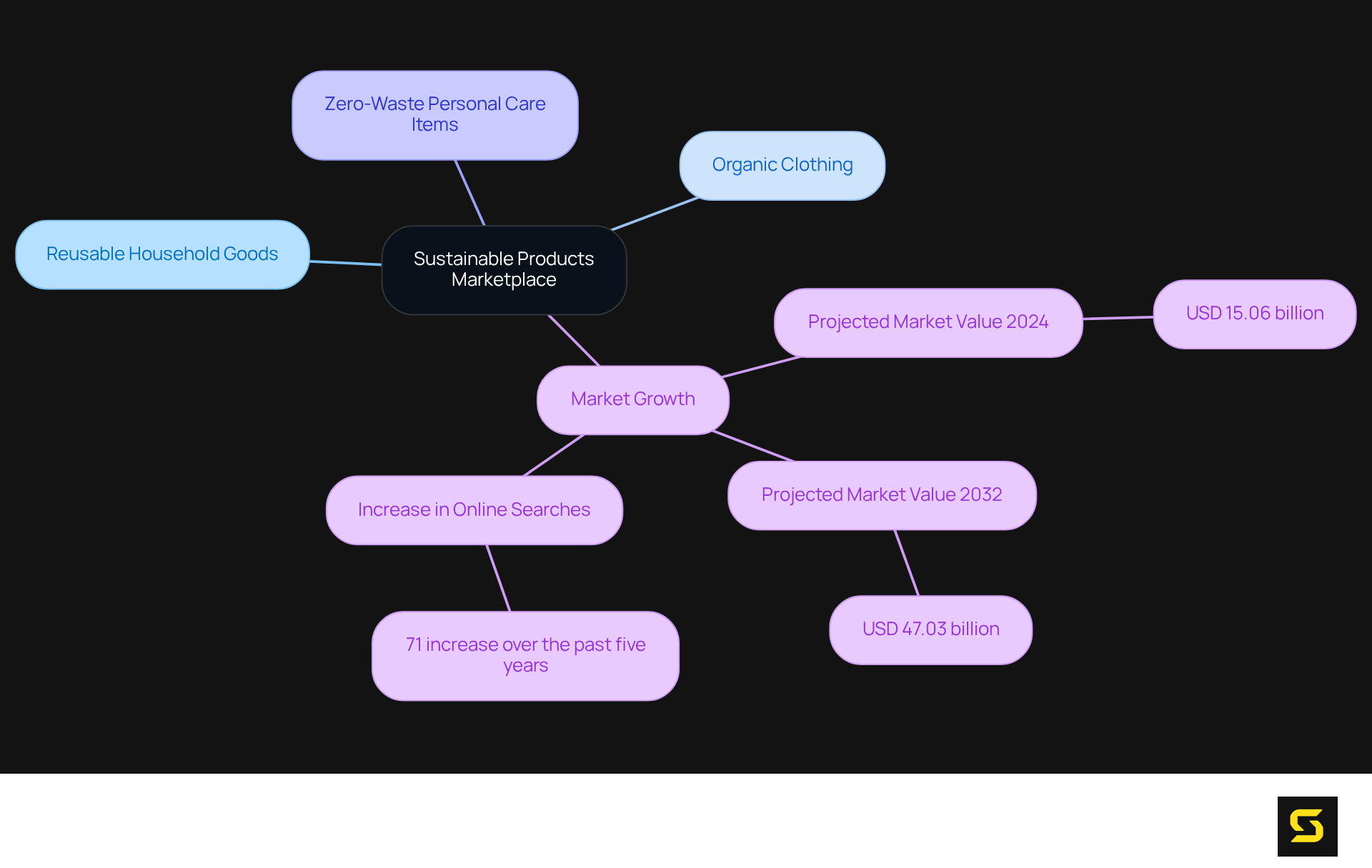
Remote Work Essentials Marketplace: Focus on Home Office Solutions
As remote work solidifies its status as a standard practice, exploring niche marketplace ideas dedicated to home office essentials presents a lucrative opportunity. This niche marketplace can showcase:
- Ergonomic furniture
- Productivity tools
- Tech accessories specifically crafted to elevate the remote work experience
Research underscores that ergonomic furniture can substantially enhance productivity, with studies indicating that optimal seating and desk arrangements can yield a 15% increase in employee efficiency. Moreover, with 39% of surveyed companies fully remote, the demand for niche marketplace ideas focused on home office solutions continues to surge.
Successful remote work necessitates a shift in mindset and the adoption of digital tools that facilitate communication and collaboration among distributed teams, as highlighted by Sujatha R., a Technical Writer at DigitalOcean. By partnering with SDA, companies can harness advanced software development to create a seamless online shopping experience, allowing customers to effortlessly discover and acquire the products essential for optimizing their home office setups.
This strategy not only addresses the increasing demand for but also incorporates niche marketplace ideas to position businesses for success in the evolving e-commerce landscape. Furthermore, integrating tools such as Zoom, Slack, and Asana can significantly enhance the remote work environment, making this approach even more relevant.
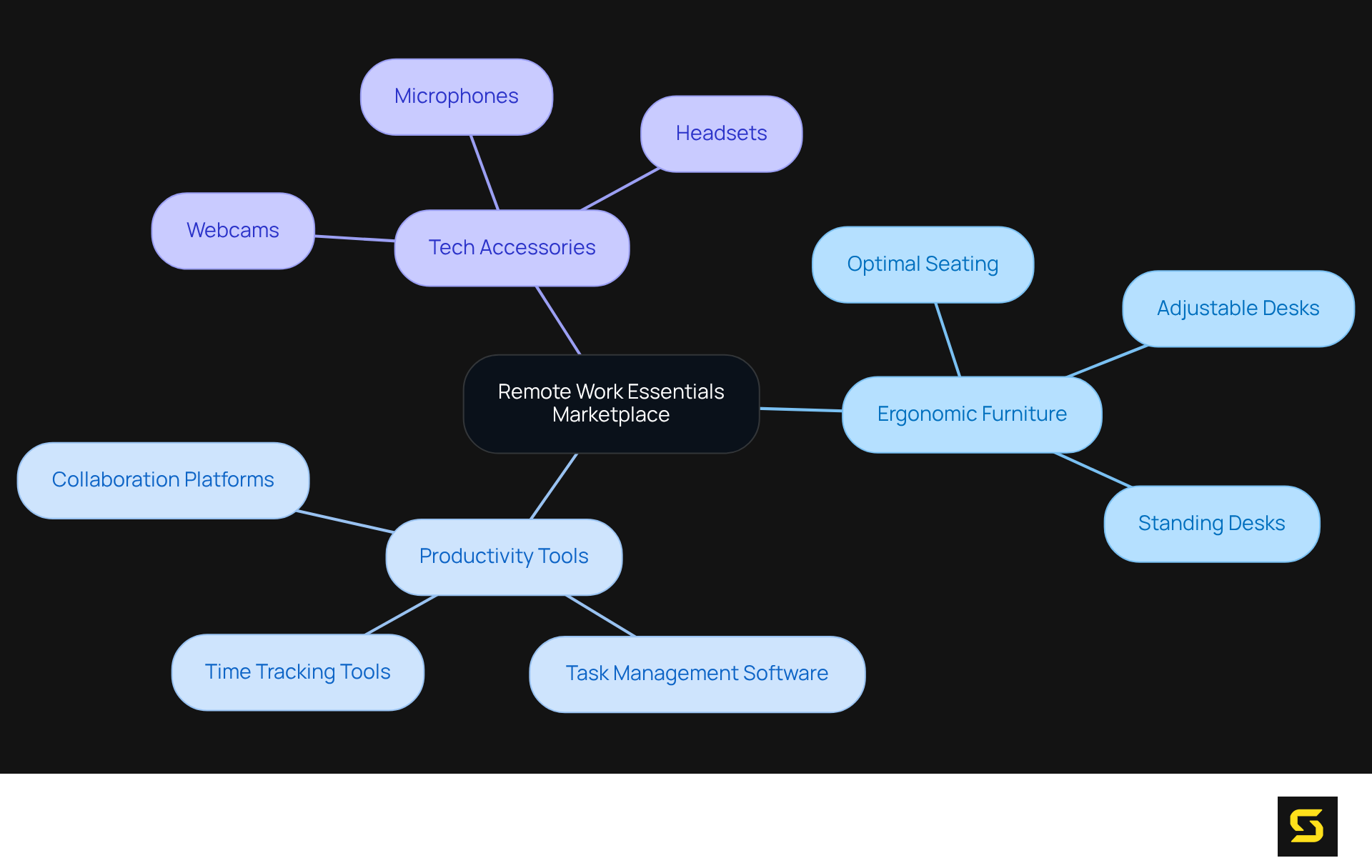
Pet Products Marketplace: Offer Unique Supplies for Pet Owners
A pet supplies marketplace presents an extensive array of unique items, ranging from organic pet food to custom pet accessories. Leveraging SDA's expertise in custom software development, businesses can craft an engaging platform that empowers pet owners to discover products tailored to their pets' specific needs. Features such as subscription services for pet food and personalized item recommendations significantly enhance customer loyalty and satisfaction.
With soaring to $157 billion by 2025, pet owners are increasingly inclined to invest in high-quality products, with 42% opting for premium pet food. Successful services like Chewy.com demonstrate that customized software solutions can markedly elevate user engagement and drive sales, positioning companies for sustained growth in a competitive landscape.
Furthermore, with approximately 40% of pet owners purchasing their pet food and treats online, it is imperative to leverage technology to streamline the shopping experience.
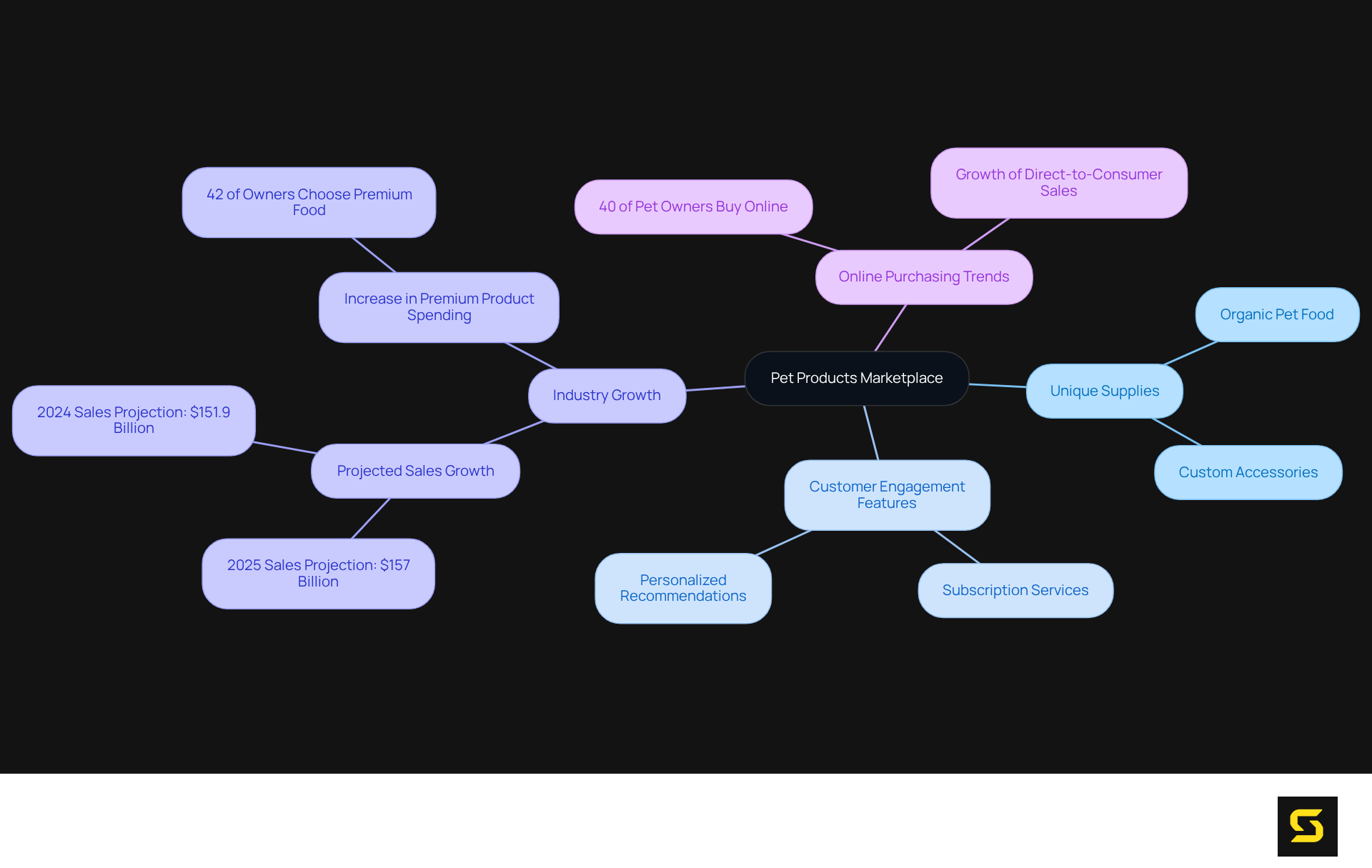
Online Education Marketplace: Provide Specialized Learning Resources
An online education marketplace is an example of niche marketplace ideas, serving as a vital hub for specialized learning resources and offering courses in areas such as coding, digital marketing, and personal development. By leveraging SDA's expertise in custom software development, businesses can create systems that provide interactive learning experiences, community forums, and personalized learning paths. This strategy not only enriches the educational experience but also cultivates a strong sense of community among learners, enabling them to learn without borders or limits.
Statistics reveal that during the pandemic, over reported positive experiences, underscoring the effectiveness of well-designed digital education solutions. Furthermore, leaders in educational technology, such as Bill Gates, emphasize the transformative potential of interactive systems, noting their capacity to significantly enhance learner engagement and retention. By focusing on these critical aspects, organizations can develop effective e-learning systems that meet the diverse needs of their users and promote substantial educational outcomes.
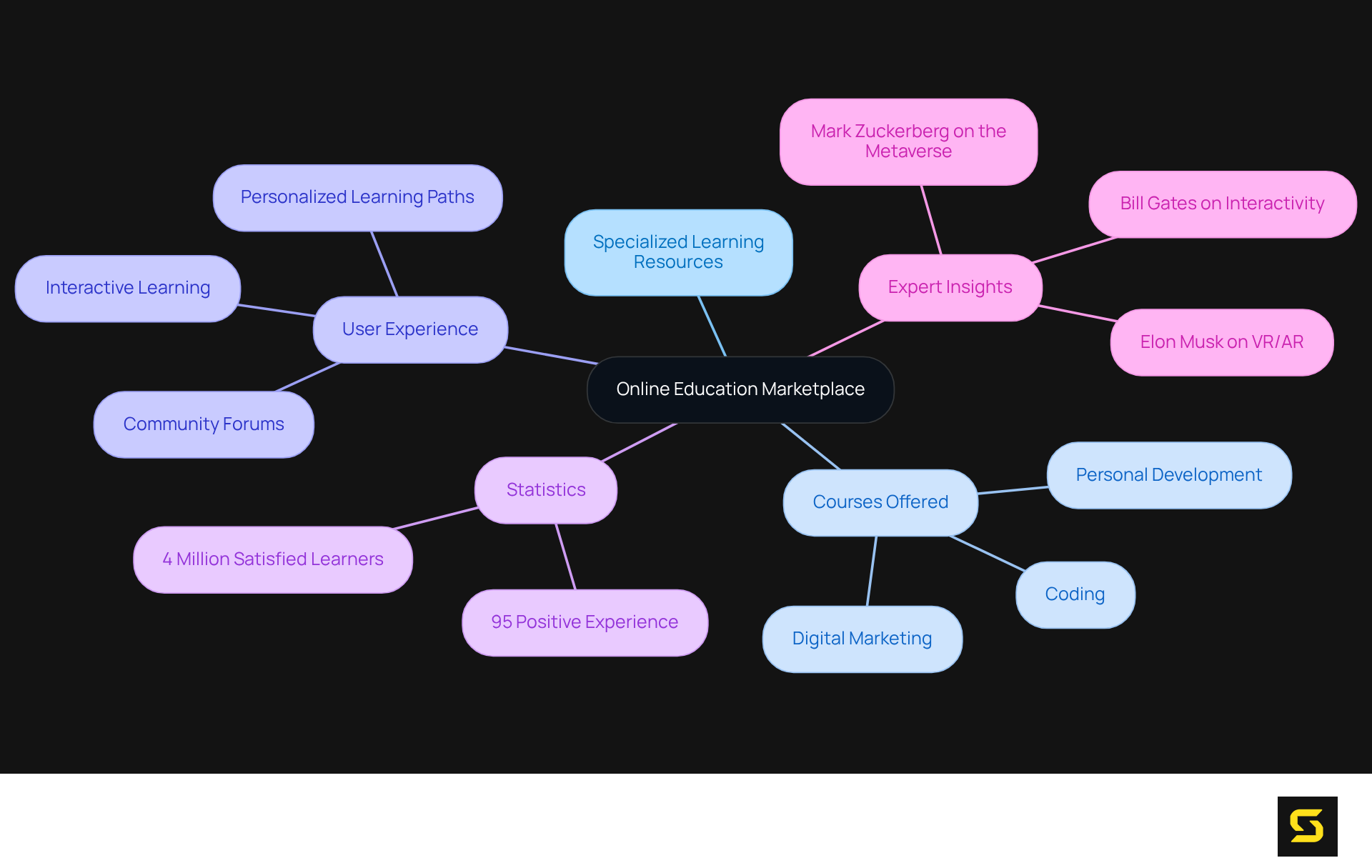
Gaming Accessories Marketplace: Target the Gaming Community
A gaming accessories marketplace showcases various niche marketplace ideas, ranging from high-performance peripherals to collectible merchandise. By partnering with SDA, organizations can create a platform that not only showcases these offerings but also fosters interaction within the gaming community. Key features, including user reviews, interactive gaming forums, and live-streamed events, are pivotal in enhancing customer loyalty and driving sales.
The gaming accessories market is projected to reach USD 8.4 billion by 2025 and is anticipated to grow to USD 15.7 billion by 2032, with a CAGR of 9.3%. To thrive, leveraging and niche marketplace ideas is essential, as industry leaders highlight that engaging consumers through tailored software solutions can significantly boost participation and satisfaction.
Phil Spencer emphasizes that gaming is evolving into a more immersive, personal, and accessible experience, underscoring the importance of these trends in community engagement strategies. Furthermore, with nearly 227 million individuals in the U.S. participating in video gaming, companies have a substantial audience to engage through effective community strategies.
Platforms that prioritize user interaction and feedback are better positioned to cultivate a dedicated customer base, ultimately contributing to sustained growth in this competitive landscape.
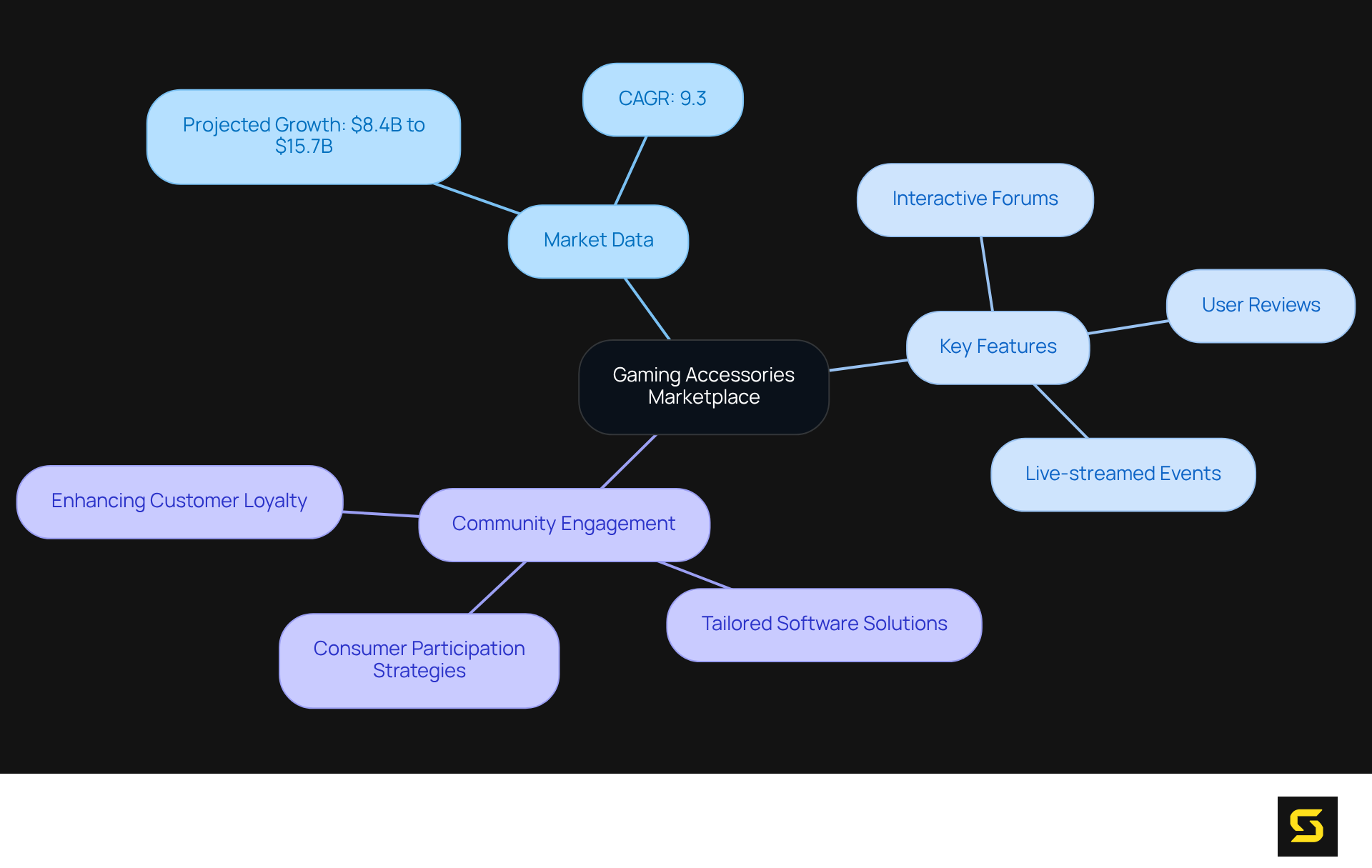
Fashion Niche Marketplace: Cater to Specific Styles and Trends
A fashion niche marketplace idea is poised to effectively cater to specific styles, including vintage clothing, sustainable fashion, and plus-size apparel. Leveraging SDA's custom software development skills enables organizations to create visually captivating interfaces that not only showcase their unique offerings but also engage customers through personalized suggestions and tailored style guides. This approach is essential in a competitive market; can lead to significantly higher conversion rates.
In fact, 63% of brands that implement personalization report an increase in conversions. Moreover, 43% of purchases are influenced by personalized recommendations or promotions, underscoring the profound impact of personalization on sales. As the fashion industry continues to evolve, there is a rising demand for niche marketplace ideas that align with consumer preferences. Consequently, it is imperative for businesses to adopt innovative software solutions that enhance user experience and drive sales.
Industry leaders assert that utilizing technology for personalization is no longer optional; it is a critical component for success in today's economy. Milan Kovacevic, a brand marketing specialist, emphasizes, "With higher engagement rates, increased time on site, and superior conversion performance, interactive video is no longer optional—it's a competitive necessity."
Furthermore, projections indicate that the sustainable clothing market will exceed 6% by 2026, reflecting the shifting consumer preferences towards sustainability in fashion. However, many fashion brands face challenges with personalization due to limitations in e-commerce technology, highlighting the urgent need for robust solutions.
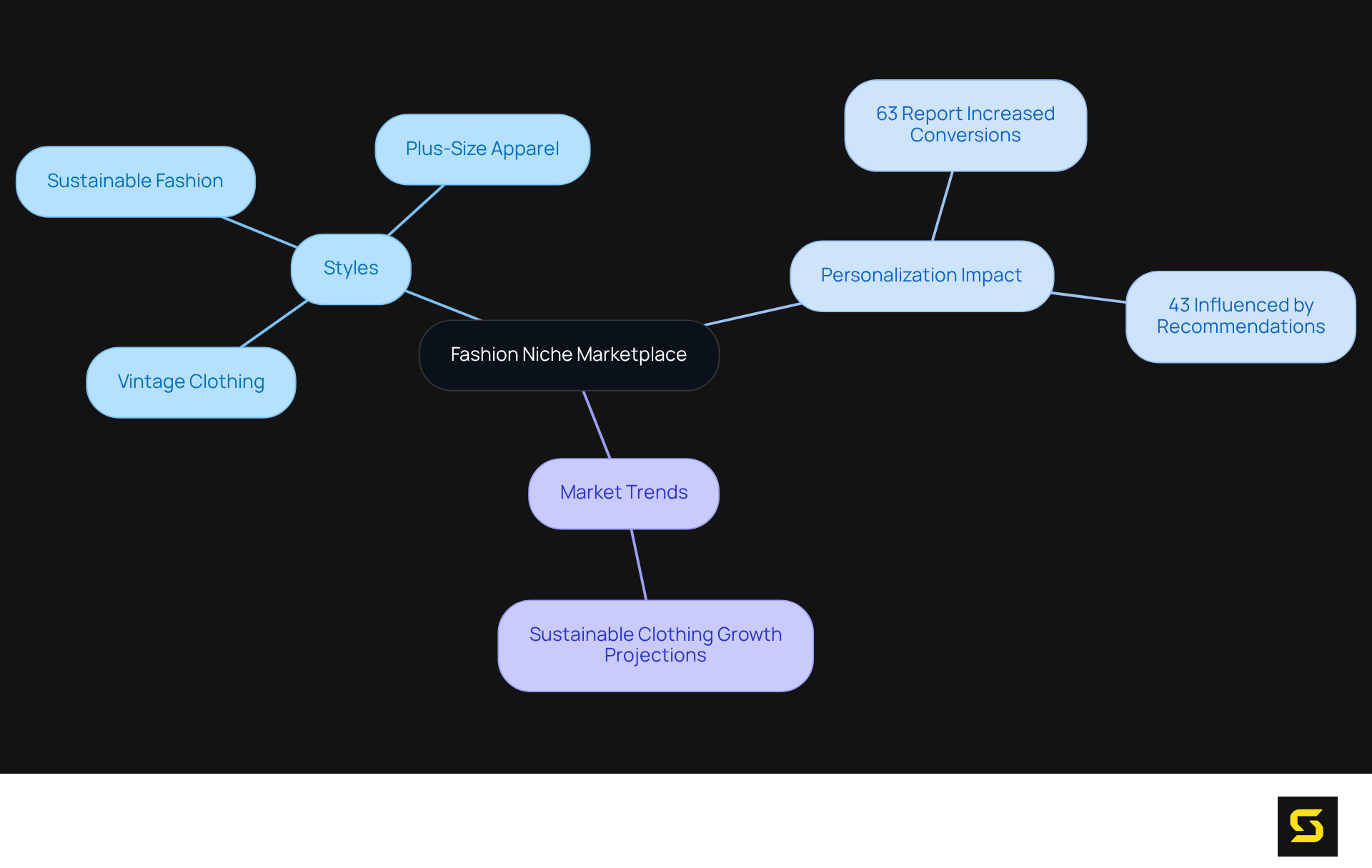
Home Improvement Marketplace: Supply Tools and Materials for DIY Enthusiasts
A home improvement marketplace stands as a vital resource, offering a diverse array of tools and materials for DIY enthusiasts, ranging from power tools to home decor supplies. Leveraging SDA's expertise in custom software solutions, businesses can construct a robust system that delivers instructional content, innovative project ideas, and personalized recommendations tailored to user needs. This strategy not only elevates the shopping experience but also cultivates a vibrant community of DIY enthusiasts eager to share their projects and insights.
With the U.S. projected to reach a staggering $526.1 billion in 2024, the necessity for engaging and informative platforms is unmistakable. Moreover, with 73% of Millennials actively engaging in DIY projects, the integration of user-generated content (UGC) can significantly enhance engagement and conversion rates, with interactions yielding a remarkable 167% conversion lift. Additionally, over half of DIY consumers express a greater likelihood of purchasing products when more educational resources are accessible, underscoring the importance of instructional content.
By concentrating on these key elements, businesses can forge a compelling online environment that adeptly addresses the evolving demands of DIY consumers.
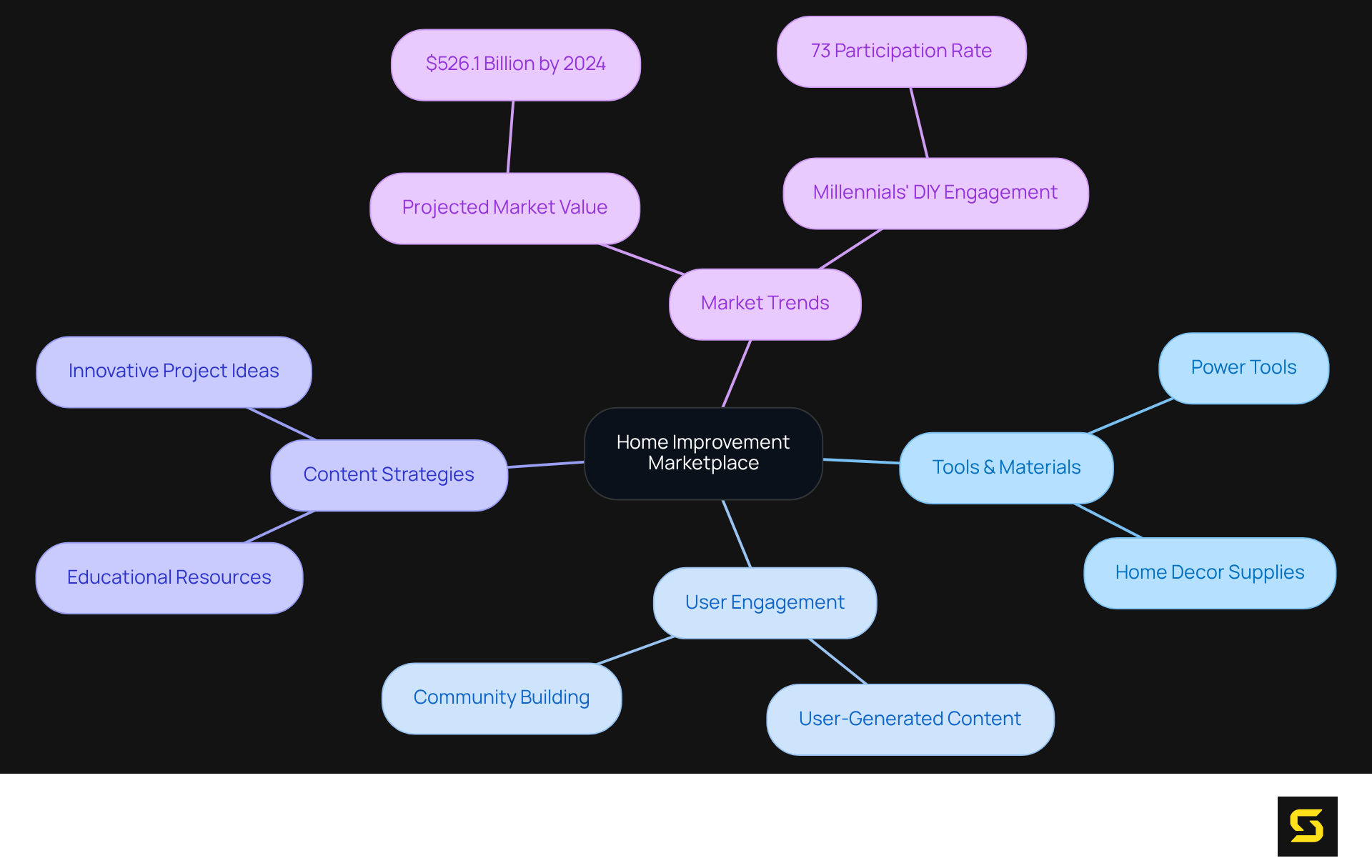
Conclusion
Exploring niche marketplace ideas presents a transformative opportunity for businesses aiming for targeted success in an increasingly competitive landscape. By focusing on specific market segments, companies can create tailored platforms that resonate with distinct audiences, driving engagement and enhancing customer satisfaction. Emphasizing user-centric design and strategic investment is essential for developing robust and adaptable solutions that meet evolving consumer needs.
The article outlines various niche marketplace concepts, from print-on-demand and health and wellness platforms to sustainable products and remote work essentials. Each idea highlights the importance of personalization, community engagement, and innovative software solutions in fostering customer loyalty and driving sales. Successful examples like Reverb, Rover, and Chewy demonstrate how specialized offerings can capture dedicated customer bases and facilitate sustainable growth.
As the market continues to shift towards personalized and eco-conscious solutions, businesses are encouraged to leverage these insights to carve out their space in the digital economy. By embracing the unique demands of targeted audiences and investing in custom software development, companies can not only thrive in their respective niches but also contribute to a more engaged and satisfied consumer base. The time to innovate and adapt is now: the potential for success in niche marketplaces is vast and waiting to be tapped.
Frequently Asked Questions
What is SDA and what role does it play in custom software development?
SDA is a leader in custom software development, specializing in creating niche marketplace platforms tailored to distinct audiences. They focus on user-centric design and advanced technologies to enhance user engagement and drive sales.
How does SDA ensure the quality of its marketplace solutions?
SDA is committed to quality assurance and utilizes dedicated development teams to ensure that each marketplace solution is robust, scalable, and adaptable to market demands.
Why is user-focused design important in niche marketplaces?
User-focused design is crucial because systems designed with the user in mind achieve higher engagement rates and conversion metrics, leading to better overall performance of the marketplace.
What is the projected growth of the personalized products market?
The personalized products market is projected to reach $46.2 billion by 2027, indicating significant potential for tailored solutions in niche marketplaces.
Can you provide examples of successful niche marketplace ideas?
Successful examples include Reverb and Rover, which demonstrate how tailored solutions can capture dedicated customer bases and drive sustainable growth.
What challenges do specialized platforms face?
Specialized platforms face challenges such as the need for strategic investment and partnerships, which are essential for scaling and achieving mainstream adoption.
How does the print-on-demand model benefit entrepreneurs?
The print-on-demand model allows entrepreneurs to create unique products for targeted audiences, reducing initial investment costs and enabling quick testing of new concepts.
What is the projected growth of the print-on-demand market?
The print-on-demand market is projected to reach $75.30 billion by 2033, with an annual growth rate of 26%.
What features can enhance user engagement on health and wellness platforms?
Incorporating features such as fitness tracking and community support can significantly enhance user engagement on health and wellness platforms.
What do consumers prioritize when it comes to wellness products?
Statistics indicate that 70% of consumers prioritize eco-friendly and ethically made wellness items, reflecting a strong demand for transparency and sustainability in the market.





